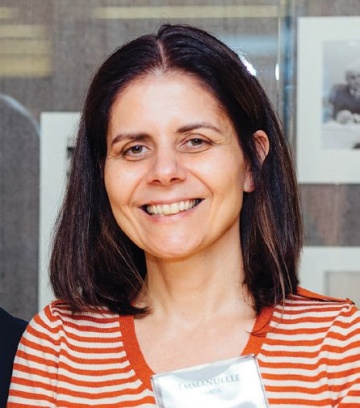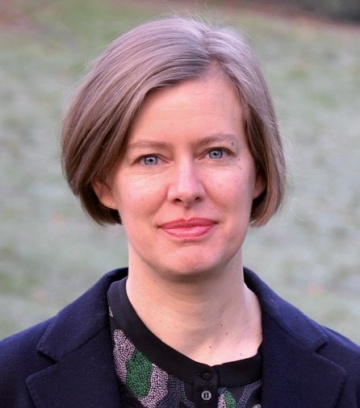Columbia College | Columbia University in the City of New York
Three Core Chairs Finish Their Terms
The College will see a major changing of the guard this summer, as three of the five Core Curriculum chairs complete their three-year terms on June 30: Noam Elcott ’00, the Jonathan Sobel & Marcia Dunn Program Chair for Art Humanities; Emmanuelle Saada, chair of Contemporary Civilization; and Joanna Stalnaker, the Paul Brooke Program Chair for Literature Humanities.
Elcott, Saada and Stalnaker helmed the Core during an especially significant time. An extended celebration of the Core Centennial began in fall 2019, as the curriculum transitioned into its second century; then the turbulence of the Covid-19 pandemic arrived the following spring. Larry Jackson, associate dean of Academic Affairs, Core Curriculum and Undergraduate Programs, praised their efforts. “At a moment marked by serious crisis, they were innovative, they improvised, they worked relentlessly to get us through,” Jackson says. “With amazing care and sensitivity, they were able to make sure we didn’t compromise the rigor or the quality of the work, and were tireless advocates for instructors, preceptors and students.”

Noam Elcott ’00
MORITZ WEHRMANN
For Contemporary Civilization, Saada introduced a unit on race and justice and added texts by David Walker, Frederick Douglass, Martin Luther King Jr., Angela Davis and James Baldwin. She also created CC Chats, conversations with scholars and experts that tied CC texts to contemporary issues. (A syllabus review for CC is in progress.)

Emmanuelle Saada
JAIME DANIES SEAS’20
Stalnaker introduced the Contemporary Core requirement to Lit Hum, assigning a modern work to be read in the fall term that complements the ancient texts being taught during that time. “One of the concerns around Lit Hum was that you have an entire term devoted exclusively to ancient Greek and Roman works, then in the second term, you race through 2,000 years of literature,” Jackson says. “Joanna was sensitive to and mindful of the ways that can create exclusions on the syllabus.” In 2019, Stalnaker assigned Father Comes Home from the Wars by Suzan-Lori Parks, which responds to Black Lives Matter and racial justice in the United States, but also to Homer’s Odyssey. In 2020, Citizen: An American Lyric, by Claudia Rankine SOA’93, was added to students’ summer reading.

Joanna Stalnaker
ERIC LEVEAU
The new Core chairs will assume their roles on July 1. Kathy Eden, the Chavkin Family Professor of English Literature and a professor of classics, will be the interim chair of Lit Hum for one year; Joseph Howley, an associate professor of classics, will assume the role in July 2022. Carole Rovane, the Violin Family Professor of Philosophy, will be the new chair of CC; and Zoë Strother, the Riggio Professor of African Art, will chair Art Hum. (David Helfand and Elaine Sisman will remain chairs for Frontiers of Science and Music Humanities, respectively.) Jackson says the new chairs will set the intellectual agendas for their courses, mentor new instructors and graduate preceptors, and be part of a collective conversation about the overall purpose of the Core. “There’s a real need for us to build bridges between these courses, so that students can see what the connections are,” Jackson says. “Questions about the content of the Core, the intellectual goals and frameworks, will continue to be big questions for the new chairs as part of an ongoing consideration of how we can make the curriculum even better and more vital.”
The chairs will also be involved with the Committee for the Second Century of the Core, a diverse, multi-generational group of College leaders, alumni and students. The committee has had four meetings over the last six months; Jackson expects their recommendations will be forthcoming. “We’re really bringing the Core into the 21st century and drawing out what is most exciting and important about it, which is the ways in which it prepares students to think about the contemporary world,” he says.
— Jill C. Shomer
Issue Contents
Published three times a year by Columbia College for alumni, students, faculty, parents and friends.
Columbia Alumni Center
622 W. 113th St., MC 4530, 6th Fl.
New York, NY 10025
212-851-7852
cct@columbia.edu
Columbia Alumni Center
622 W. 113th St., MC 4530, 4th Fl.
New York, NY 10025
212-851-7488
ccalumni@columbia.edu

